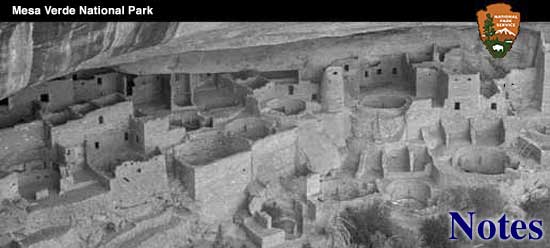|
Introduction
Nature Notes were park newsletters issued at
many of the National Parks starting in the early 1920s: Yosemite (1922),
Mount Rainier (1923), Yellowstone (1924), Grand Canyon (1926), Glacier
(1927), Crater Lake (1928), Rocky Mountain (1928), Zion/Bryce (1929),
Mesa Verde (1930), Hawaii (1931), Acadia (1932), Lassen (1932), Hot
Springs (1934), Grand Teton (1935), and Shenandoah (1936).
Mesa Verde elected to drop Nature from their
Notes as described in the first issue.

In 1906 Congress created the Mesa Verde National Park to insure the
permanent preservation and protection of these most notable and best
preserved cliff dwellings in the known world. By its nature and reasons
for existence, the park has always been primarily of an educational
character, but only during more recent years, about the last nine or
ten, have educational activities assumed their proper importance.
During the early years of excavation and exploration the knowledge
gained benefited only the favored few, but, with the inauguration of
improved highways and the adoption of the automobile as the favored mode
of travel, Mesa Verde is now accessible to all, and the information of
the prehistoric inhabitants, which has been gained through many years of
research and diligent study, now awaits every visitor.
The first publication of "Mesa Verde Notes" marks an important step in
the development and advancement of educational work in the park. The word
"nature" has been purposely avoided in the title of this pamphlet
because we wish to cover the broader aspects of the Mesa Verde and its
prehistoric human inhabitants, as well as its natural features and
phenomena. Every effort will be made to obtain articles that carry some
human-interest, worth-while story, whether it be of the prehistoric
peoples, the modern Indian, or wild life of the park.
This special Web collection is just a sampling of the
editions published in the 1930s and includes text and images as they
were originally published. To maintain historical accuracy, we are also
including drawings of skeletal remains and descriptions of burial
objects as they originally appeared in these issues.
|


